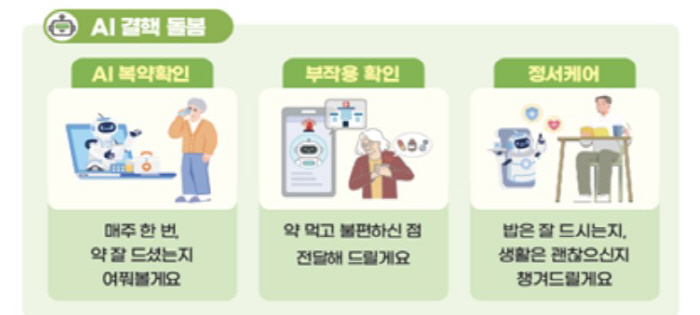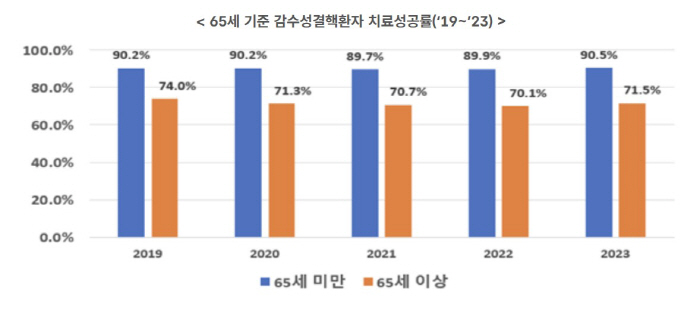Taking Tuberculosis Medication for the Elderly, which AI takes care of...Starting in July, a pilot project for the phone service to confirm medication will be carried out
|
From July 1 to June 30, 2026, the Korea Centers for Disease Control and Prevention will implement a pilot project of AI phone service to confirm tuberculosis medication for tuberculosis patients aged 65 or older in Daegu and Gyeongbuk.
|
Tuberculosis requires long-term medication for at least six months, and low adherence to medication can lead to serious consequences such as treatment failure, recurrence, and multidrug-resistant tuberculosis. However, due to the inconvenience and inconvenience of having to take several types of drugs (more than four) for more than six months a day, there are many cases where they cannot continue taking them, and due to the long treatment period, they give up in the middle due to the increased psychological, physical, and economic burden. In addition, symptoms often improve significantly within two to three months when tuberculosis treatment is started, so there are many cases in which patients stop taking drugs because they misunderstand that they have been cured. In addition, drugs are often discontinued arbitrarily due to various side effects such as hepatotoxicity, gastrointestinal disorders, skin rash, and vision impairment.
In this regard, the Korea Centers for Disease Control and Prevention has expanded the subject of medication management from infectious tuberculosis patients to all tuberculosis patients who have started treatment since June last year.
The pilot project for AI phone service to confirm tuberculosis medication will be implemented for about 300 tuberculosis patients aged 65 or older who agreed to participate in the pilot project among tuberculosis patients reported in Daegu and Gyeongbuk between July and November 2025. For tuberculosis patients who participated in the pilot project, ▲ For about two weeks after being first reported, tuberculosis management personnel check medication every day, and ▲ After that, the degree to which it affects treatment compliance, such as age, comorbidities, multidrug resistance, and living alone, is classified into three stages (high, medium, and low), and medication management is carried out through dedicated personnel and AI phones. The ▲ low-risk group will be managed more closely by increasing the number of medication checks from once a month to four times a week for the ▲ medium-risk group from once a week to twice a week, and the ▲ high-risk group will be managed more closely by increasing the number of medication checks from four times a week to five times a week.
AI phones not only check medication, but also check health conditions such as meals and sleep, and calls are monitored at the AI control center. If special matters such as health abnormalities are detected during the monitoring process, they will be immediately delivered to health centers and medical institutions' tuberculosis management personnel or reported to 119 in an emergency situation.
The pilot project is expected to allow tuberculosis management personnel to focus on the management of patients with problems, leading to an improvement in the success rate of tuberculosis treatment. As a similar project, about 90% of the project participants showed high satisfaction in the case of 'AI Clova Care Call', which was introduced on a trial basis to care services for people aged 65 or older living alone.
The pilot project will be operated as a public-private cooperation model involving the Korea Centers for Disease Control and Prevention, the Gyeongbuk Disease Response Center, Daegu Metropolitan City, Gyeongsangbuk-do, PPM medical institutions, and a private consortium composed of Naver, Happiness Room, and Sejong Networks along with the Korea Tuberculosis Association.
After the pilot project is over, the Korea Centers for Disease Control and Prevention will conduct a satisfaction survey and effect analysis of patients and tuberculosis management personnel, and will actively consider expanding the country if positive results are confirmed.
Meanwhile, in addition to tuberculosis drugs, AI-based medication management SaaS (service-as-a-service software) has also appeared for chronic patients and multiple pharmaceutical users. AI provides various functions such as checking the safety of drug components, managing medication records, and monitoring side effects.
This article was translated by Naver AI translator.





